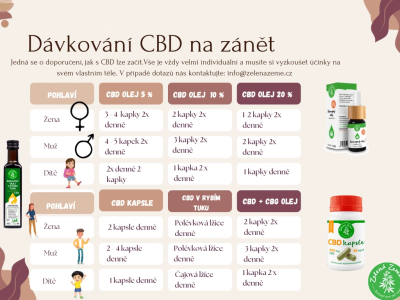Naturally combat inflammation with CBD
Author: Lucie Garabasova
CBD is a non-psychoactive cannabinoid with a wide range of beneficial effects. One of its most significant properties is its ability to combat inflammation. Naturally occurring in the hemp plant, CBD products are entirely natural. Could it be considered a revolutionary discovery in the fight against inflammation? What other natural remedies for inflammation exist? And what exactly is inflammation?
Understanding inflammation
To understand how CBD and other herbs work against inflammation, we first need to understand what inflammation actually is.
Inflammation is a physiological process that is part of the body's defense mechanism, responding to various types of tissue damage or infections.
The goal of inflammation is to restore normal tissue function and remove damaged cells.
Inflammation is a crucial part of the immune system and is usually a sign that the body is responding to an external or internal threat.
Inflammation can be divided into two main types
- Acute inflammation: This type of inflammation occurs suddenly and is usually short-term. Its main characteristics typically include pain, swelling, redness, and fever. Acute inflammation is a normal response to severe injury, infection, or surgery. It helps isolate the damaged area and initiate the healing process.
- Chronic inflammation: This type of inflammation is long-term and can persist for an extended period, sometimes even years. It is associated with a range of chronic diseases, such as autoimmune disorders (e.g., rheumatoid arthritis), chronic conditions (e.g., chronic bronchitis), and others. Chronic inflammation can damage tissues and organs and may lead to serious health problems.
The inflammatory process
- Vasodilation: Blood vessels expand, increasing blood flow to the affected area, causing heat and redness.
- Increased vascular permeability: Allows white blood cells (leukocytes) to enter the area and fight infection.
- Leukocyte migration: White blood cells target and eliminate infectious agents or damaged cells.
- Inflammatory response: Release of mediators like cytokines to regulate the immune reaction.
- Healing and regeneration: Following the resolution of infection or damage, tissue repair begins.
Symptoms of inflammation:
- Pain: Dull, sharp, throbbing, or burning sensations.
- Swelling: Fluid accumulation causes tissue enlargement.
- Redness: Increased blood flow to the area.
- Heat: Localized temperature increase in the affected region.
- Limited Mobility: Joint inflammation can restrict movement.
- Fatigue and Weakness: Energy is diverted to combat inflammation.
Studies suggest that CBD may have significant anti-inflammatory properties.
How CBD works against inflammation?
According to the latest study from August 2023, the cannabinoid CBD, found in hemp, is particularly effective against inflammation. CBD is commonly present in products such as CBD oils, capsules, teas, and more.
CBD activates the enzyme 15-lipoxygenase-1, which enhances the production of substances that combat inflammation. Researchers arrived at this conclusion through experiments on cell cultures, later confirming their findings in animal studies.
The research results could eventually lead to new types of treatments for inflammatory diseases.
As the lead scientist of the study, Jordan, explains, CBD essentially acts as a switch that turns inflammation in the relevant immune cells from "ON" to "OFF."
All evidence suggests that the cannabinoid CBD plays a key role, being not only the most effective in addressing inflammation but also free of the psychoactive effects associated with THC.
What is the enzyme 15-lipoxygenase-1?
The enzyme 15-lipoxygenase-1 (15-LOX-1) is a lipid enzyme that catalyzes the oxidation of unsaturated fatty acids in the body. Specifically, 15-LOX-1 converts arachidonic acid (a type of unsaturated fatty acid) into various biologically active products known as leukotrienes.
Leukotrienes are signaling molecules that play a crucial role in inflammation and immune responses. These molecules are involved in various physiological processes, including inflammation regulation, smooth muscle contraction, and immune reaction. In some cases, excessive activity of 15-LOX-1 and overproduction of leukotrienes may contribute to pathological processes such as inflammatory diseases.
15-LOX-1 has different variants that can be expressed in various tissues and organs throughout the body. Its role in physiological processes and health conditions remains a topic of ongoing research, but it appears to have a significant impact on inflammation and immune responses. Disorders associated with excessive 15-LOX-1 activity may be linked to certain inflammatory diseases, such as atherosclerosis (plaque formation in blood vessels) and asthma.
Herbs for reducing inflammation in the body
These herbs have proven anti-inflammatory properties:
- Turmeric (Curcuma longa): Turmeric contains curcumin, an active compound with strong anti-inflammatory effects. It is commonly used as a spice and can be added to meals or taken as a dietary supplement.
- Hemp (Cannabis sativa) – specifically cannabidiol (CBD), as discussed earlier.
- Ginger (Zingiber officinale): Ginger contains gingerol, which has anti-inflammatory properties. You can make ginger tea or add fresh ginger to dishes.
- Boswellia (Boswellia serrata): Also known as Indian frankincense, this herb contains compounds that can help reduce inflammation. It is available as a dietary supplement.
- Yarrow (Achillea millefolium): Yarrow has anti-inflammatory and antiseptic properties. It can be used as a tea or in herbal remedies.
- Bromelain (found in pineapple): Bromelain is an enzyme in pineapple with anti-inflammatory effects. It is available as a dietary supplement.
- Parsley (Petroselinum crispum): Parsley contains compounds that may help reduce inflammation. It can be used as a spice or as a fresh herb in meals.
- Sage (Salvia officinalis): Sage has anti-inflammatory and antibacterial properties and can be used as tea or in herbal remedies.
- Ginkgo biloba: Ginkgo biloba contains flavonoids with anti-inflammatory and antioxidant properties. It is commonly used as a dietary supplement.
- Comfrey (Symphytum officinale): Traditionally used for its anti-inflammatory properties, comfrey can be applied as an ointment or compress.
- Chamomile (Matricaria chamomilla): Chamomile has anti-inflammatory and calming effects. It can be consumed as tea or used in herbal preparations (try hemp tea with chamomile).
Herbs for intestinal inflammation
If you're dealing with intestinal inflammation, these herbs may be helpful:
- Aloe Vera: Aloe vera has anti-inflammatory and healing properties that can benefit intestinal health. It is available as gels or juices, which should be used as directed.
- Boswellia (Indian Frankincense): Boswellia contains compounds that may help reduce inflammation in the digestive tract. It is available as dietary supplements.
- Marshmallow root (Althaea officinalis): This herb contains mucilage, which can protect the intestinal lining from irritation and inflammation. It can be consumed as tea or in supplement form.
- Slippery Elm (Ulmus rubra): Slippery elm is rich in mucilage and can soothe irritated intestinal walls. It is available as tea or dietary supplements.
- Rhubarb (Rheum rhabarbarum): Traditionally used for its laxative and anti-inflammatory effects on the digestive system, rhubarb can be consumed as herbal tea.
If you're experiencing inflammation in veins or tendons, consider using a suitable hemp-based topical product.
How is inflammation treated?
In addition to the above-mentioned CBD, you can support inflammation treatment by incorporating the following into your diet:
- Fruits and vegetables: Foods rich in antioxidants, vitamins, and minerals, such as broccoli, spinach, strawberries, and blueberries, can help reduce inflammation.
- Fish Oil: Contains omega-3 fatty acids with strong anti-inflammatory properties, particularly beneficial for conditions like rheumatoid arthritis.
- Omega-3 rich oils: Oils from fish, flaxseeds, hemp seeds, and walnuts are rich in omega-3 fatty acids, which help combat inflammation.
- Turmeric: Contains curcumin, a natural anti-inflammatory compound. Turmeric can be used as a spice or added to meals.
- Green tea: Packed with antioxidants that help reduce inflammation.
- Whole grains: Whole-grain bread, brown rice, and oats are high in fiber and can help reduce inflammation.
- Low-fat dairy products: Opt for low-fat versions of dairy products instead of full-fat options.
Inflammation is also treated using anti-inflammatory medications (e.g., ibuprofen, aspirin, etc.), corticosteroids, antibiotics, biological therapies (especially for autoimmune diseases), or in some cases, surgical intervention (if the inflammation is associated with tissue damage). In most cases, lifestyle changes are also considered.


